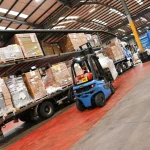
Design Meets Functionality: The Role of Wooden Pallets in Streamlining Kenya’s Avocado Supply Chain.
The Growing Demand for Kenyan Avocados
Kenya’s avocado industry is booming, with exports reaching global markets at an impressive rate. As one of Africa’s largest avocado producers, Kenya supplies premium-quality fruit to markets in Europe, the Middle East, and Asia. Efficient logistics are critical in ensuring the fruit arrives fresh and undamaged. One of the key components in this logistics chain is the use of wooden pallets, which play a vital role in improving handling, storage, and transportation efficiency.
Why Wooden Pallets Are Essential for the Avocado Supply Chain
Wooden pallets are an indispensable tool in the agricultural supply chain. They provide structure, stability, and ease of transport, making them a smart investment for avocado farmers and exporters.
Enhanced Load Stability
Wooden pallets provide a stable base for stacking avocado crates, preventing damage during transit. They distribute weight evenly, reducing pressure points that can lead to bruising or spoilage. By ensuring a firm foundation, pallets help prevent product loss and maintain the quality of avocados until they reach their final destination.
Improved Air Circulation
Proper ventilation is essential to prevent spoilage and extend the shelf life of avocados. Wooden pallets allow for optimal airflow between stacked crates, helping regulate temperature and humidity. This is particularly important during long-haul transportation, where poor ventilation could result in premature ripening or rotting.
Ease of Handling and Transportation
Wooden pallets are designed to be compatible with forklifts and pallet jacks, allowing for efficient loading and unloading. This reduces manual handling, minimizing labor costs and the risk of damaging the fruit. Standardized pallet sizes also facilitate streamlined storage in warehouses, trucks, and shipping containers.
Sustainability and Cost-Effectiveness of Wooden Pallets
Eco-Friendly and Reusable
Wooden pallets are made from renewable resources, making them an environmentally friendly option. They can be repaired, reused, and eventually recycled into new pallets or repurposed into wood products such as furniture or compost. This helps reduce waste and promotes sustainability within the supply chain.
Affordability Compared to Plastic Alternatives
Wooden pallets offer a cost-effective solution for transporting and storing avocados. Compared to plastic alternatives, they are more affordable while still providing durability and functionality. Their repairability further extends their lifespan, making them a smart investment for businesses looking to optimize logistics costs.
Challenges and Solutions in Using Wooden Pallets
Despite their many advantages, wooden pallets do present some challenges. However, these can be mitigated through proper handling and treatment.
Risk of Contamination
Since wooden pallets are organic materials, they can harbor bacteria, fungi, or pests. To maintain hygiene standards, it is essential to use heat-treated or fumigated pallets that comply with international phytosanitary regulations such as the ISPM 15 standard. This ensures the safe export of avocados without the risk of contamination.
Moisture Absorption
Wood is naturally porous and can absorb moisture, which may lead to mold growth. To prevent this, kiln-dried pallets are recommended. Proper storage in dry, well-ventilated areas also helps keep pallets in optimal condition, preserving the integrity of the avocados they transport.
Best Practices for Using Wooden Pallets in Avocado Logistics
To maximize the benefits of wooden pallets in the avocado supply chain, businesses should follow these best practices:
- Choose high-quality pallets: Opt for pallets that are sturdy and meet industry standards for weight capacity and durability.
- Inspect regularly: Check pallets for signs of wear, cracks, or contamination before each use.
- Store properly: Keep pallets in dry, ventilated areas to prevent moisture-related issues.
- Follow phytosanitary regulations: Ensure compliance with export regulations by using heat-treated pallets.
- Train staff on pallet handling: Proper handling techniques reduce the risk of accidents and product damage.
Conclusion: A Smart Investment for Avocado Exporters
Wooden pallets are indispensable in Kenya’s avocado supply chain. They enhance efficiency, ensure product quality, and support sustainability. By choosing high-quality, well-maintained pallets, exporters can optimize their logistics operations and deliver fresh, premium avocados to global markets. Investing in wooden pallets is a strategic move that contributes to a more streamlined, cost-effective, and environmentally responsible avocado export business.





Add a comment